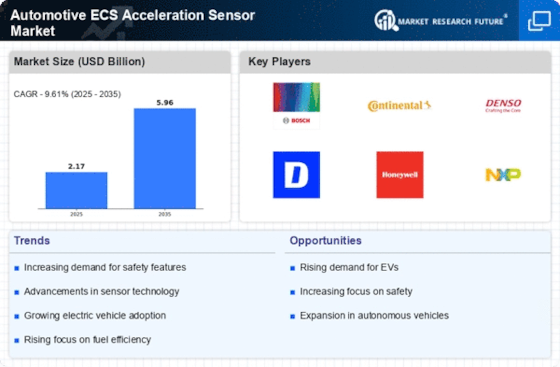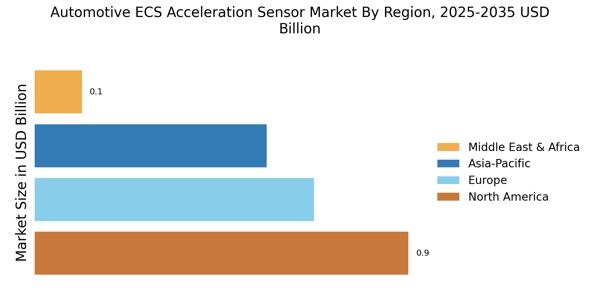Increasing Adoption of Electric Vehicles
The shift towards electric vehicles (EVs) is a significant driver for the Automotive ECS Acceleration Sensor Market. As the automotive landscape evolves, the demand for efficient and reliable acceleration sensors in EVs is on the rise. These sensors are vital for optimizing performance and energy management in electric drivetrains. With the global push for sustainable transportation solutions, the market for EVs is expected to expand rapidly, leading to an increased need for ECS acceleration sensors. Industry forecasts suggest that by 2030, electric vehicles could account for a substantial percentage of total vehicle sales, thereby creating a lucrative opportunity for sensor manufacturers to cater to this growing segment.
Rising Demand for Enhanced Vehicle Safety
The Automotive ECS Acceleration Sensor Market is experiencing a notable surge in demand driven by the increasing emphasis on vehicle safety. As consumers become more aware of safety features, manufacturers are integrating advanced acceleration sensors to enhance vehicle stability and control. According to industry reports, the market for automotive safety systems is projected to grow significantly, with acceleration sensors playing a crucial role in systems such as Electronic Stability Control (ESC). This heightened focus on safety is likely to propel the adoption of ECS acceleration sensors, as they are essential for real-time monitoring and response to dynamic driving conditions, thereby reducing the risk of accidents and improving overall vehicle safety.
Regulatory Compliance and Safety Standards
Regulatory compliance and safety standards are becoming increasingly stringent, driving the Automotive ECS Acceleration Sensor Market. Governments worldwide are implementing regulations that mandate the inclusion of advanced safety features in vehicles, including acceleration sensors. These regulations aim to enhance road safety and reduce accident rates. As a result, automotive manufacturers are compelled to integrate ECS acceleration sensors into their vehicles to meet these compliance requirements. The market is likely to benefit from this trend, as adherence to safety standards not only ensures legal compliance but also enhances brand reputation and consumer trust, further propelling the demand for these sensors.
Technological Advancements in Sensor Technology
Technological advancements are significantly influencing the Automotive ECS Acceleration Sensor Market. Innovations in sensor technology, such as MEMS (Micro-Electro-Mechanical Systems), are enhancing the performance and accuracy of acceleration sensors. These advancements allow for more precise measurements and quicker response times, which are critical for modern vehicle dynamics. The integration of these advanced sensors into vehicles is expected to increase, as manufacturers seek to improve vehicle handling and safety features. Furthermore, the market is projected to witness a compound annual growth rate (CAGR) of over 7% in the coming years, indicating a robust growth trajectory fueled by these technological innovations.
Growing Focus on Vehicle Performance and Dynamics
The Automotive ECS Acceleration Sensor Market is also being driven by a growing focus on vehicle performance and dynamics. Consumers are increasingly seeking vehicles that offer superior handling, responsiveness, and overall driving experience. Acceleration sensors play a pivotal role in achieving these performance metrics by providing real-time data that informs vehicle control systems. As manufacturers strive to differentiate their products in a competitive market, the integration of high-performance ECS acceleration sensors is becoming a key strategy. This trend is expected to contribute to the market's growth, as enhanced vehicle dynamics not only attract consumers but also improve safety and efficiency.
















